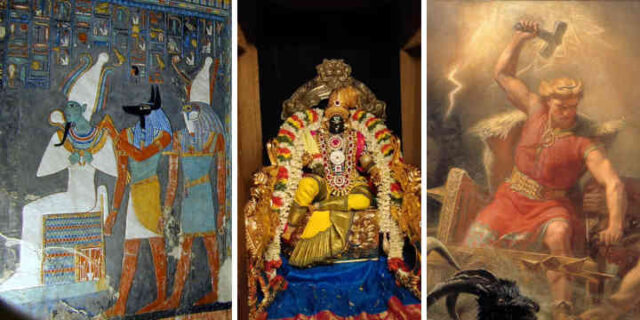It isn’t unreasonable to believe in God or gods or a higher power – after all, most people do – but which religion is true, or most believable?
How can we assess different beliefs and decide for ourselves? Or are we left to simply wonder …. and doubt?
We will all see things differently, but here’s a few of my speculative thoughts and musings.
Reasons to believe
The arguments for some sort of god or force outside our universe are (to me) very persuasive.
It goes against sense and reason to think that the universe just exists without cause. We know enough about the physics of the universe to conclude that it hasn’t always existed (it is running down, according to the second law of thermodynamics), nor could it have begun out of nothing – nothing comes out of nothing!
And it strains credulity to think it just happens to have physical laws that, against all the odds, allow stars, planets and complex chemistry to appear and then allow human life to evolve. As many cosmologists say, it looks like it was designed.
So it seems most reasonable to conclude that something outside and unlike our universe, i.e. something not material and not bound by the time and space of the physical universe, caused it. (Some say that if God was outside of all time he could do nothing, because change requires time. I’m unconvinced by that argument, but for now let’s say that this force or god is simply outside our universe’s time and space.)
And so we get to a god or some “force”.
But if we accept that logic, how could we possibly decide what god, what power? There are so many possibilities.
Who cares?
It’s reasonable to ask, why worry? Why not get on with living our lives in the short time we have?
There are two reasons why I think this is an important question I want to resolve.
- Humans are curious. We want to find out all we can about our universe. We want to know the truth. I want to know the truth, if I can. I don’t want to die wondering.
- Some religions claim great benefits for those who believe in their God. What we believe affects how we live. There are also some wellbeing advantages in religious belief. If there’s something good going (in this life or the next), I don’t want to miss out.
Sorting through the possibilities
1. Impersonal force?
An impersonal force, perhaps a little like the Star Wars “Force”, could meet the requirements of being a non-physical entity not bound by our universe’s time or space. It’s an interesting option, attractive for some because it explains the universe without making any demands on us.
But there are other apparent facts about our world and our human experience that it doesn’t explain. It is hard to find any evolutionary reason why consciousness should arise, and any way for us to have morality and free will without God being personal, logical and ethical, and wanting us to be the same. Evolution in an impersonal world wouldn’t lead to ethical, rational, conscious humans.
It also seems that there can be little purpose in our creation – and impersonal force can hardly have a purpose. I suppose this isn’t in itself a reason to reject this idea, but it certainly takes something away from our humanity.
So either I give up the “humanity” of the human race, or I can’t accept the idea of creation by an impersonal force.
2. A distant, uncaring God?
Perhaps a personal God created the world and humans to live in it simply to see what happened. He/she/it may be watching, or may have moved on to some other project. Either way, it makes no difference to us.
I can see this makes more sense than an impersonal force, and it would certainly explain why the world sometimes seems to be a planet without hope and purpose.
But again, it seems to leave little purpose in our creation and therefore little purpose in life. We have to somehow make our own purpose.
Furthermore, people seem to have experiences of God. They see visions, or they are healed of illnesses, or they feel God has communicated with them. Some of these stories are surely mistakes or urban myths, but some are well documented. These things seem to me to indicate something more than a distant, uncaring God.
3. God very much cares – about how we live
This might be the most common idea of God in the western world today. God is beyond dogma, beyond all the religions. He or she is just wanting us to live well, to care for each other and simply be good people.
This certainly gives our creation and our lives a strong purpose – to live in a “good” way. But it isn’t clear what is the end result of human life if this is true. Do we all enter an afterlife? Or just those who live up to a certain standard? Or is this life all we get?
It is hard to see answers to those, and many other, questions. Nevertheless, this is an attractive and reasonable belief. It explains why a world exists, it explains how humanity has godlike qualities like personhood, ethics and reason, without godlike powers. It can see all religions as human attempts to please God, with none of them being more true than the others, but some are more humane and helpful than others.
But it means that God has done little or nothing to communicate with us and give us an inkling of what he/she is on about and requires of us. If all receive an afterlife, then it doesn’t really matter how we live, and this belief seems a little pointless. It may be true, but why bother?
But if entering an afterlife is conditional on our behaviour, it seems cruel to condemn some people without giving them any hints about what they should be doing. Perhaps we can answer this objection by pointing to our conscience as being the God-given guide to how to behave.
But it still seems impossibly arbitrary. If the goodness of our lives determines our fate in the afterlife, what is the cut off? Could someone miss out by falling one good deed short of the standard? And what would be the fate of those who fail the test?
So I feel a lot of sympathy for this view, but the problems make it hard for me to believe it.
4. God has revealed himself through one of the religions
This makes a lot of sense. If God made us for a purpose, you’d think he or she would let us know and give us some guidelines about whe was expected of us.
But the big difficulty with this view is: which religion?
They are so different, they can’t all be right, Though there is also a lot in common, so they might all be partly right.
I have examined all the major world religions against a number of criteria of believability (Choosing my religion). My most important criterion is that the religion has a large following – there wouldn’t be much point in God revealing himself (yes, these religions generally have male Gods) to just a few people.
That leaves just four religions – Buddhism, Christianity, Hinduism and Islam. (I have a lot of respect for Sikhism and Baha’i, but they are so small that I can’t see they can be how God has revealed himself to the world.)
Buddhism
I have a lot of respect for the Buddha, I think his story shows a good character and he had a lot of interesting things to say, but he didn’t really reveal God. We can learn from his teachings but I don’t feel he gave me reason to believe there is a personal God behind his teachings.
Hinduism
I find it harder to think Hinduism is how God, or the gods, have revealed himself, herself or themselves. I can only give my perspective but Hinduism feels like other polytheistic religions (e.g. Egyptian, Norse, Greek or Roman gods) where the behaviour of the gods doesn’t seem very godlike.
Islam
Islam certainly claims to reveal God or Allah, and it is obviously a meaningful and often loving religion for many people. But again, a personal perspective: I have read parts of the Koran (only in English!) and it seems to me to be derivative of both Judaism and Christianity, with some of its teachings not as elevated as those of Jesus, but harsh and law-based more like Old Testament Judaism. And I personally (based on limited knowledge, admittedly) find Jesus a more attractive prophet than Mohammed.
Christianity
Of the four major religions, Christianity seems to me to be the most believable, ethical and loving. You won’t be surprised I think that of course. But I think Jesus is the most convincing of the religious gurus and his teachings the “highest” – “love God wholeheartedly and love neightbour as self” seems to me to be the highest of all ethics. I find the idea of his resurrection believable and appropriate, and I think the historical evidence for Jesus, his teachings and miracles is second to none among world religions.
So I feel I can answer the question “which religion?” with quite a strong sense of the rightness of Christianity. That doesn’t mean I think the others are all “wrong”, for I can see truth and goodness in all of them, to a greater or lesser degree. But I conclude that Christianity contains a greater level of truth.
There are however aspects of traditional CHristianity that I cannot accept – an inerrant Bible, some of the behaviour attributed to God in the Old Testament, Christian exclusivism (only Christians inherit the afterlife), and the idea of hell. But there are many different approaches to Christian faith, and I think we can resolve these dilemmas.
It leaves open the question of how God decides who inherits an afterlife – what does he/she require us to believe or do? I believe God is more loving and accepting than traditional Christianity has often taught, and while I’m not a universalist, it may nevertheless be the truth (which would be nice).
5. None of the religions fully reveal God but he/she accepts all faithful believers
This seems to be a growing belief in first world pluralistic countries where many religions are represented. It is common to hear people express belief in God according to their “faith tradition” – a way of being less exclusive in one’s beliefs.
Recognising that religions differ greatly, it is possible to believe that God looks lovingly at all faithful believers and accepts them for their heart attitude rather then because of the rightness of their belief systems.
If this was true, you’d have to think that God would accept genuine non-believers as well, taking as back to something close to option #3.
This view is loving, accepting, undogmatic and seems logical, but most believers in most religions might not agree – commitment to one religion generally leads to a rejection of others.
Choosing my religion
I chose my religion decades ago. And while I have modified my beliefs extensively since then, nothing I’ve found has led me to change my mind.
So I believe in Christianity, I am a follower of Jesus (option 4). But it seems to me that options 3 & 5 have attractive and credible aspects. I can’t believe only Christian believers, exclusively, are “saved”. I don’t know how God’s love might spread much wider, but there are hints in the Bible that it does.
So I’m inclined to think that Jesus is the fullest revelation of God’s character, and his life, death & resurrection achieved something for the whole world, but nevertheless people of all beliefs can only respond to the light they are given, and God sees us from that perspective, and his love is great.
I’m not kidding myself ….
This has been a very shallow and brief analysis of some serious ideas. Of course it’s not nearly enough to decide the issue.
But there is a lot of serious thought behind these ruminations. If you’re interested, you might like to check out some of the links.
Thanks for reading!
Please leave a comment if you have something to say.
Main graphic: (1) The gods Osiris, Anubis, and Horus in the Tomb of Horemheb in the Valley of the Kings. Jean-Pierre Dalbéra in Wikpedia. (2) Statue of earth goddess Bhumi. Pointn in Wikipedia. (3) Thor’s Fight with the Giants by Mårten Eskil Winge (1872), in Wikipedia.




